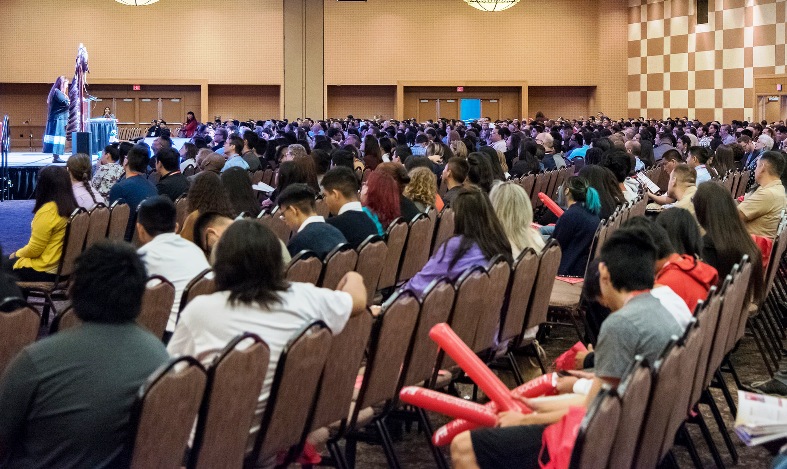
On October 4 to 6, 2018, the American Indian Science and Engineering Society (AISES) held its annual National Conference in Oklahoma City.
On October 4 to 6, 2018, the American Indian Science and Engineering Society (AISES) held its annual National Conference in Oklahoma City. The conference focuses on sharing knowledge around Indigenous educational, professional, and workforce development, and this year’s event was well attended, with over 2000 registrants and 200 exhibitors.

Presenters at the conference’s 40 sessions spoke on a wide variety of topics including best practices for outreach; mentorship models and programs; Indigenous underrepresentation in education and professions; the cultural challenges of living “between two worlds”; social and personal barriers faced by Indigenous students; high school outreach programs; Indigenous inclusion in STEAM programs; Indigenization of curricula; research initiatives and findings; individual stories of struggle and success, and more.
Collectively, these sessions offered a forum to share a rich variety of observations and data, while discussing ongoing challenges such as outdated funding models and programs that misrecognize certain core aspects of Indigenous people’s experience.
Matthew Dunn, member of the Engineers Canada Equitable Participation in Engineering Committee noted, “the conference sessions provided a great opportunity to learn about and share best practices when it comes to increasing participation in the STEM fields for Indigenous Peoples and non-Indigenous allies.” He also appreciated the chance to connect in person with the Canadian Indigenous Advisory Council to AISES and other Canadian members.
“There are amazing people in Canada and the United States who are working on increasing the representation of Indigenous students and professionals in science and engineering,” he says, adding that one of the biggest highlights was meeting Joe Connolly, an aerospace engineer for NASA.
“My initial career goal was to become an aerospace engineer, so it was pretty surreal to geek out with Joe about supersonic aircraft at the AISES Pow Wow.”
Also in attendance was Queen’s University Applied Science student Brielle Thorsen, who is the first AISES Canadian National Student Representative. She recounts a moving moment at the conference, when everyone stood up with a paper that said, “We Are Indigenous, We Are Scientists.”
“This was so powerful and demonstrated the community that AISES provides for our people.”
Thorsen was also impressed by the conference format. “The way the conference is run,” she notes, “is a perfect example of Western ways and Indigenous ways working symbiotically.” In particular, she admired the way organizers were able to remove power differentials and introduce a personable atmosphere to the proceedings while still maintaining the feel of a professional conference.
“The conference incorporated beautiful ceremonies, Elder’s blessings, project presentations, amazing sessions, great music, career opportunities and so much more,” Thorsen says. “It is an amazing opportunity for spiritual and professional growth, and it was therefore a lifechanging experience.” She added that “having the opportunity to combine the two worlds we navigate” had immeasurable value for her as a student.
Notably, AISES’s relatively new Canadian chapter,.caISES, will hold its second Gathering at McGill University from March 1 to 3, 2019. To learn more about the event, stay tuned on the .caISES 2019 Gathering web site.

